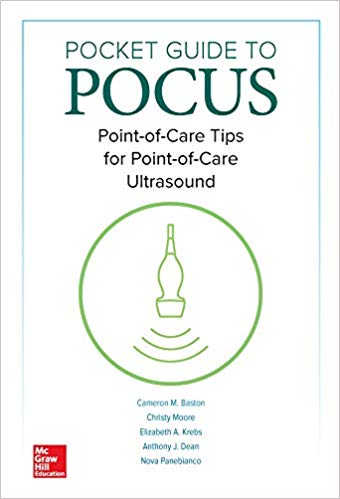Focus on POCUS with Dr. Cameron Baston



Cameron Baston, MD, MSCE is an Attending Physician at the University of Pennsylvania Medical Center, an Assistant Professor of Clinical Medicine and the Director of Clinician Performed Ultrasound for the Department of Medicine. A pulmonary critical care physician by training, Dr. Baston has also done a Point of Care Ultrasound Fellowship through the University of Pennsylvania Emergency Medicine Department. He is the author of Pocket Guide to POCUS: Point-of-Care Tips for Point-of-Care Ultrasound.
AccessMedicine: Why is POCUS so hot right now?
Dr. Baston: Don’t get me wrong, docs absolutely love new toys as much as anyone else. And the new POCUS machines are sleek and powerful, with lots of cool new features. But I really think that two things are the primary drivers for internal medicine docs finally jumping on the POCUS bandwagon:
First, this is the first diagnostic technological advance that actually brings us back to the bedside. A POCUS examination means more hands-on time with a patient, instead of burying ourselves in the EMR. Studies have shown that this results in higher patient satisfaction scores, and anecdotally, it makes us feel more like the doctors we really want to be.
And second, at heart we all want to be the best doctors we can be. This technology is not some sort of miraculous fix for diagnostic uncertainty, but over and over again the research has shown that POCUS can make us more accurate in our diagnoses, with no ionizing radiation, and no direct costs to the patient. Even internists are starting to be convinced.
AccessMedicine: Will this really replace the stethoscope or is that all hype?
Dr. Baston: Ha! I am fascinated by the idea that each new technological advance somehow attacks all that came before it. We POCUS enthusiasts like to quote John Forbes, who wrote “Notwithstanding its value, I am extremely doubtful, because its beneficial application requires much time, and gives a good deal of trouble both to the patient and the practitioner.” But he wasn’t talking about POCUS, that quote was a part of the initial review to Laennec’s manuscript introducing the stethoscope! But just as the stethoscope did not completely displace the observation and palpation that were the only options before hand, stethoscopes still have utility in the era of POCUS. I still use mine when assessing for wheezing, or listening for stridor. I simply don’t try to use it to answer questions for which POCUS has been demonstrated as being superior, like detecting a pneumothorax, or assessing a heart valve.
AccessMedicine: How is medical education tackling POCUS training?
Dr. Baston: Several programs have become leaders in POCUS programs during undergraduate medical training, while others are focused on graduate medical training, and still others are only targeting faculty development. Especially in internal medicine there is an incredible shortage of local experts, leaving many programs unsure of how to safely integrate a program without sufficient staff for quality control or even educational development. Our group is trying to tackle this at several levels simultaneously, with POCUS augmented anatomy courses for pre-clinical students, POCUS augmented physical exam rounds for clinical students, rotation specific POCUS skills for our residents, advanced training for our clinical fellows, and continuous faculty development. It’s a lot of work! Eventually I imagine that everyone who shows up for residency will be capable of the appropriate introductory POCUS examination, but for now there is incredible heterogeneity of the level of new physicians coming into practice, which means lots of opportunity for great educational innovation and research.
AccessMedicine: Why this book, right now?
Dr. Baston: There are several great POCUS textbooks on the market, but when we were working with our new learners we found that they were too in-depth to be carried to the bedside. They were an excellent resource for self-study in the highly motivated learner, but what most of our trainees needed was something in their pocket that they could glance at for rapid, just-in-time reminders of the indications, acquisition methods, interpretations, and known pathology. Our book works to address just that need, with a binder that fits into a white coat pocket, and sections that easily pop out of the binder for quick reinforcement and guidance at the bedside. We also focused on the areas of point-of-care ultrasound most relevant to the internal medicine provider, whereas most POCUS texts are written by and for emergency medicine physicians. That being said, the examinations we described are certainly useful in many settings and for many specialties. Finally, a lot of effort was put into making sure that almost every still picture in the book has an accompanying video clip accessible online at AccessMedicine.com/POCUS.
AccessMedicine: Give us a behind the scenes into making this book:
Dr. Baston: This was a truly iterative process. We sat down with experts from medical school education, internal medicine, emergency medicine, and critical care and really worked to develop a list of our highest yield chapters. Then we developed our template for each chapter, trying to ensure that the experience for the user was consistent as they moved from exam to exam. Finally, we identified what images would really add to the text and help clarify concepts. After years of doing this, our group has an incredible library of example videos, from which we extracted still images of POCUS findings. For the pictures of patient positioning and scanning technique, however, we decided to have some fun and had several photo shoot days, where one of the authors would dress as a patient and end up practically submerged in ultrasound gel. Any reader who can tell which of the images are of patients and which ones are of the authors checking out a second career as a model deserves a beer on us!!
To purchase a hardcopy of Pocket Guide to POCUS: Point-of-Care Tips for Point-of-Care Ultrasound, visit Amazon.com.
If your institution subscribes to AccessMedicine, you can access the entire book here. Use or create your MyAccess Profile to access the content from anywhere! If your institution does not provide access, ask your medical librarian about subscribing.





Create a Free MyAccess Profile
AccessMedicine Network is the place to keep up on new releases for the Access products, get short form didactic content, read up on practice impacting highlights, and watch video featuring authors of your favorite books in medicine. Create a MyAccess profile and follow our contributors to stay informed via email updates.